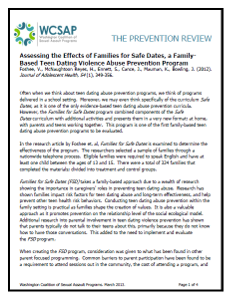Medium
Topic
- Parents & Caregivers
- Curriculums
- Healthy Relationships
Foshee, V. et all (2012). Journal of Adolescent Health.
Often when we think about teen dating abuse prevention programs, we think of programs delivered in a school setting. Moreover, we may even think specifically of the curriculum Safe Dates, as it is one of the only evidence-based teen dating abuse prevention curricula. However, the Families for Safe Dates program combined components of the Safe Dates curriculum with additional activities and presents them in a very new format: at home, with parents and teens working together. This program is one of the first family-based teen dating abuse prevention programs to be evaluated.
In the research article by Foshee et. al, Families for Safe Dates is examined to determine the effectiveness of the program. The researchers selected a sample of families through a nationwide telephone process. Eligible families were required to speak English and have at least one child between the ages of 13 and 15. There were a total of 324 families that completed the materials; divided into treatment and control groups.
Families for Safe Dates (FSD) takes a family-based approach due to a wealth of research showing the importance in caregivers' roles in preventing teen dating abuse. Research has shown families impact risk factors for teen dating abuse, long-term effectiveness, and help prevent other teen health risk behaviors. Conducting teen dating abuse prevention within the family setting is practical as families shape the creation of values and valuable as it increases the spheres of influence. Additional research into parental involvement in teen dating violence has shown that parents typically do not talk to their teens about this and one of the largest reasons is they do not know how to have those conversations. This added to the need to implement and evaluate the FSD program.
